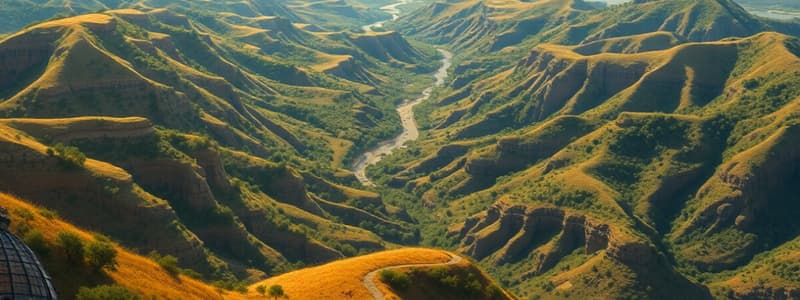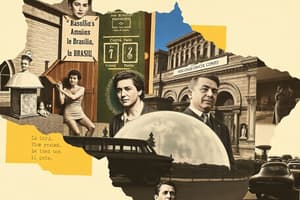Podcast
Questions and Answers
Which ideological division was symbolized by the Iron Curtain during the Cold War?
Which ideological division was symbolized by the Iron Curtain during the Cold War?
- Division between agricultural and industrial nations
- Division between neutral states and belligerent countries
- Division between capitalist and communist countries (correct)
- Division between former empires and their colonies
What major event had a significant impact on the borders of European countries, particularly with the dissolution of empires?
What major event had a significant impact on the borders of European countries, particularly with the dissolution of empires?
- World War II
- The Napoleonic Wars
- The Crimean War
- World War I (correct)
What factor often contributes to natural barriers between countries?
What factor often contributes to natural barriers between countries?
- Cultural differences
- Natural resources (correct)
- Weather patterns
- Population density
Which countries are noted for having been powerful empire builders competing for land and resources?
Which countries are noted for having been powerful empire builders competing for land and resources?
What was a major consequence of wars throughout history in Europe?
What was a major consequence of wars throughout history in Europe?
Which geographical features are often considered as barriers in the context of military movement?
Which geographical features are often considered as barriers in the context of military movement?
What is the capital of Brazil?
What is the capital of Brazil?
Which of the following statements about the Brazilian population is true?
Which of the following statements about the Brazilian population is true?
Which geographical feature stretches from Venezuela to Chile and Argentina?
Which geographical feature stretches from Venezuela to Chile and Argentina?
What societal structure is comprised of the Executive, Legislative, and Judiciary branches in Brazil?
What societal structure is comprised of the Executive, Legislative, and Judiciary branches in Brazil?
What major change occurred in Bolivia with the election of Evo Morales?
What major change occurred in Bolivia with the election of Evo Morales?
Which of the following crops was domesticated in the Andes region?
Which of the following crops was domesticated in the Andes region?
What significant event occurred in 1532 CE related to the Inca Empire?
What significant event occurred in 1532 CE related to the Inca Empire?
Who are the gauchos in the Pampas region?
Who are the gauchos in the Pampas region?
Which phenomenon significantly influenced Pampas culture?
Which phenomenon significantly influenced Pampas culture?
What defines the Southern Cone of South America?
What defines the Southern Cone of South America?
Which significant historical event heavily impacted the Gran Chaco region?
Which significant historical event heavily impacted the Gran Chaco region?
What is a characteristic of the Amazon Basin?
What is a characteristic of the Amazon Basin?
Which of the following accurately describes the European Union (EU)?
Which of the following accurately describes the European Union (EU)?
What role did immigration play in the Southern Cone during the 19th century?
What role did immigration play in the Southern Cone during the 19th century?
What is the dominant industry in the Gran Chaco region today?
What is the dominant industry in the Gran Chaco region today?
Which mountain is the highest in political Europe?
Which mountain is the highest in political Europe?
What historical impact did the arrival of the Spanish have on the Southern Cone?
What historical impact did the arrival of the Spanish have on the Southern Cone?
What is a fundamental reason for historical conflicts in Europe?
What is a fundamental reason for historical conflicts in Europe?
Which of the following features is NOT a type of landform?
Which of the following features is NOT a type of landform?
Flashcards
Brazil's Size
Brazil's Size
Brazil is the largest country in South America and the 5th largest in the world.
Brazilian Capital
Brazilian Capital
Brasília is the capital of Brazil, located Southeast of the center.
Andes Mountain Range
Andes Mountain Range
A mountain range in South America, stretching from Venezuela to Chile/Argentina, with diverse biomes.
Inca Empire
Inca Empire
Signup and view all the flashcards
Spanish Conquest
Spanish Conquest
Signup and view all the flashcards
Pampas Region
Pampas Region
Signup and view all the flashcards
Gauchos
Gauchos
Signup and view all the flashcards
Brazilian Population
Brazilian Population
Signup and view all the flashcards
Evo Morales
Evo Morales
Signup and view all the flashcards
Europe's borders
Europe's borders
Signup and view all the flashcards
Cold War Iron Curtain
Cold War Iron Curtain
Signup and view all the flashcards
European Empires
European Empires
Signup and view all the flashcards
Wars & borders
Wars & borders
Signup and view all the flashcards
Natural barriers
Natural barriers
Signup and view all the flashcards
WWI Aftermath
WWI Aftermath
Signup and view all the flashcards
Amazon Basin
Amazon Basin
Signup and view all the flashcards
Southern Cone
Southern Cone
Signup and view all the flashcards
Gran Chaco
Gran Chaco
Signup and view all the flashcards
Landform
Landform
Signup and view all the flashcards
European Union
European Union
Signup and view all the flashcards
Amerindian nations
Amerindian nations
Signup and view all the flashcards
Chaco War
Chaco War
Signup and view all the flashcards
Political Europe
Political Europe
Signup and view all the flashcards
Indigenous Discrimnation
Indigenous Discrimnation
Signup and view all the flashcards
Study Notes
Brazil
- Largest country in South America, fifth-largest globally
- Capital: Brasília, population 4.2 million, Southeast of the country's center
- Known for caves, business support, and a large national flag
- Population: 212.6 million (approx. two-thirds of US population)
- Diverse ethnic, geographic, and religious backgrounds, predominantly Roman Catholic
- Government: Executive, Legislative, and Judiciary branches
- Indigenous Brazilians (Amerindians) experienced colonization, then gained power
- Popular tourist destination, World Cup winner
South American Regions: Andes and Pampas
- Andes: Mountain range from Venezuela to Chile/Argentina, diverse biomes, climates, animals, plants
- Domestication of potatoes and coca in the Andes
- Led to the Inca Empire (Tawantinsuyu)
- Spanish conquest of Incas (1532 CE)
- Spanish criollo culture dominated Andean countries (Peru, Bolivia, etc.), mining wealth, Indigenous poverty and discrimination
- Bolivia's Evo Morales brought reforms for Indigenous people
- Pampas: Grassland region in Argentina, Uruguay, and southern Brazil
- Original inhabitants displaced by Spanish/Portuguese, cattle ranching introduced
- Gauchos (mestizo cowboys): Symbol of Pampas identity, associated with mate
- Pampas culture dominated by criollos and white Europeans, Indigenous, African, and mixed-descent people marginalized
Amazon Basin
- Drainage system of the Amazon River, parts of several South American countries
- Sparsely populated, home to diverse Amerindian nations for millennia
- Late European arrival and settlement
- Political challenges: resource extraction vs. environmentalism; political representation for remote inhabitants, and Amerindian tribe status (especially those with limited/no contact with Euro-American society)
Southern Cone
- Region below the Tropic of Capricorn, encompassing Argentina, Chile, Uruguay, Paraguay, and parts of southern Brazil
- Shared history, originally home to various Amerindian nations
- Inca Empire conquest (15th century)
- Spanish colonization
- Gaucho cowboy as a national symbol (late colonial period, later)
- Independence from Spain (early 19th century)
- Immigration encouraged for Europeans, majority from Southern/Eastern Europe.
- Dictatorships in the 20th century (e.g., Pinochet's Chile).
- European creole identity.
- Economically productive, high standard of living
Gran Chaco
- Arid to semi-arid lowland region: Argentina, Bolivia, Paraguay, small part of Brazil
- Sparse hunter-gatherer societies initially, hunting grounds for other cultures
- Largely ignored by Spanish until after independence of sharing nations
- Border disputes (Argentina-Bolivia, 1870s; Bolivia-Paraguay, Chaco War 1930s, over resources)
- Mennonite settlement (1920s onwards) from Canada and USSR
- Slow technological development, first paved highways (1960s~)
- Cattle ranching remains predominant industry
European Landforms
- Mountains: Alps (Europe's largest), Mount Ararat (Turkey), Mont Blanc, Mount Elbrus (Russia)
- Valleys: Loire & Rhône Valleys (France), Danube River Valleys (Germany)
- Canyon: Tara River Canyon (Montenegro)
- Rivers: Blue Danube (Europe's longest), Elbe River, Loire River, Rhine River
- Lake: Lake Vanern (Sweden), Lake Ladoga (Russia)
Europe: Political and Cultural
- Europe's borders and divisions: Multiple definitions of the area, including continents, countries, tectonic plates, EU member states
- ~50 countries, 28 within the European Union (EU)
- EU: Political/economic union of member states, promotes free trade/cooperation; EU Parliament elected every five years
- Free movement of people, capital, goods, and services
- Historical roots in aftermath of WWII, international cooperation to reduce conflicts
- Cultural identity tied to borders, ethnic heritage, history, language
- Land as a valuable resource and source of conflict
- Ideological divisions (Cold War, Iron Curtain)
- Imperialism and wars shaping European borders
- Physical boundaries (rivers, mountains) impacting war and borders
Studying That Suits You
Use AI to generate personalized quizzes and flashcards to suit your learning preferences.




